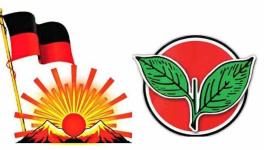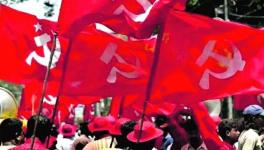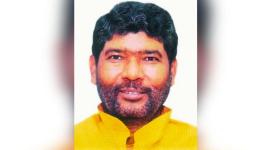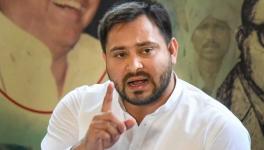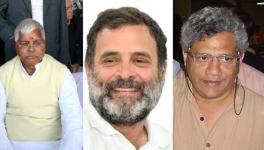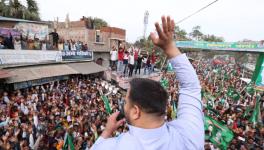Will PWF have an Impact on Tamil Nadu Elections?
Tamil Nadu has traditionally seen alliances lead by two parties dominating the polls and fight it out amongst themselves. However, 2016 assembly poll is an exception with the entry of People’s Welfare Front – a six party alliance. What impact will this alliance formed in 2015 have on the outcome of the elections? Though, many don’t bet on this alliance coming out victorious in the elections and forming a government, due to the non-consolidated support base across the state, it can spoil the party of either AIADMK or DMK. To discuss the Tamil Nadu elections and the undercurrents Newclick interviewed Srinivasan Ramani, Deputy National Editor, The Hindu. According to him the newly formed six party combine - the People’s Welfare Front is not expected to win the elections, but it will have an impact on the outcome of the elections. “This is the first time you are seeing a viable third front in Tamil Nadu. Even if it is not going to win the elections, it will be a major spoiler,” Ramani points out.
Rough Transcript:
Pranjal: Hello and welcome to Newsclick. Today we are going to discuss about the Tamil Nadu assembly elections. To discuss the issue we have with us Srinivasan Ramani, Deputy National Editor of the Hindu. Hello Srini, welcome to Newsclick.
Srinivasan Ramani (Srinivasan): Thanks for having me.
Pranjal: So if you look at the Tamil Nadu elections, the Assembly elections it looks like it's going to be a triangular fight first time. AIADMK and its allies, DMK and the People’s Welfare Front coming in. so what do you think about it?
Srinivasan: Yeah, so we can't call these elections three cornered alliance fight. The AIADMK for example has told all its contestants to fight only under the two leaves symbol that is the party symbol, so essentially its one party contesting under the AIADMK ticket. The DMK’s allies apart from the congress which is major force are primarily fringe parties, one Dalit party that became part of the alliance and then you have a few Muslim based parties. The third front on the other hand is a conglomeration of six parties which have in the past been with either of the DMK or the AIADMK left fronts so what people are calling, saying about this election is that because of the presence of this third front of the people’s welfare led by the people’s welfare front which is primarily four parties, the CPIM, the CPI, the Marumalarchi Dravida Munnetra Kazhagam led by Vaiko and Viduthalai Chiruthaigal Katchi, the Dalit Panthers party led by Thol. Thirumavalan. These four parties came together last year and they decided to contest elections together and they managed to also rope in the DMDK led by Vijaykanth and recently GK Vasan’s party, Tamil Maanila Congress. So they basically formed a six party coalition to fight the elections. Whether this six party coalitions are good enough to win the elections, nobody expects them to win the elections because they have minor support basis spread across the whole state and not concentrated in specific area so that they can win particular seats but at the same time they have the potential of being a big spoiler. The question of hour is whether they’ll spoil the fortunes of the AIADMK or will they spoil the fortunes of the DMK congress alliance. Now this is a million dollar question, many people say because the opposition space is split it will only benefit the AIADMK but that’s not necessarily true. The people who tend to vote for the AIADMK because of their proclivities against the DMK could this time vote for the DMDK as well, so DMDK left front as well. So there is no clarity on whether there’d be, who would be the biggest beneficial. Having said that one thing is clear that this Six party alliance has brought a new dimension to Tamil Nadu politics not only for the last almost 30 years or so, except for probably 1989 and to some extent 1996 this has been a two party or two alliance led, battle between two alliances always. So this is the first time you see a viable third alliance even if its not going to win its going to be a major spoiler.
Pranjal: So Vijaykanth DMDK is contesting on more than half of the states in the PWF, the people’s welfare front and he has been declared as the chief ministerial candidate also. So I mean how do you see his entry into the politics while he has been entirely since last many years focusing on ousting the two Dravidian politics, parties. So is it change in the political discourse also of the Tamil Nadu.
Srinivasan: Basically we should understand the logistics of this third front. So basically the PWF that is People’s Welfare Front has four parties, the Tamil Nationalist represented by the NDMK whose leader is Vaiko, the Dalit party which is primarily concentrated in northern Tamil Nadu that is VCK led by Thol. Thirumavalan and the two left parties. So they have some differences but primarily they’ve gotten together on a common agenda of coming up with clean, non-corrupt governance and so on. What they have done is that while they have retained their front, they have had an electoral arise with the Vijaykanth led party, okay. Now Vijaykanth led party, the DMDK doesn’t particularly have an ideology of its own, it’s a more of a party based on the charisma of its leader and tries to be everything for everyone. So its also promises a non-corrupt governance, it also promises you know welfare schemes to be delivered better. There is not much of an ideological difference between the DMK, the AIADMK and the DMDK. Now the reason why the PWF offered more seats to the DMDK is that the DMDK commanded 8-10% of the vote share in 2006 and 2011 and by default occupied the third space in the, the largest chunk of the third space in Tamil Nadu politics. Well the third space, it has had some relevance for the last 15-16 years but because primarily elections have been determined by two alliances, the third front even, the third space even if substances to 8-10% votes, it does not translate it into seats. So because the DMDK went bold and contested alone in 2006 and managed to win 8-10%, that is the reason why the smaller parties of the PWF felt that we should give more seats to the DMDK left front. Now whether it will make a difference or not, it is a difficult question to answer because in 2006 Vijaykanth brought something fresh, he was a charismatic actor who came into politics and offered a clear alternative to the DMK and the AIADMK and immediately got some cash of support from the third space. In the last ten years he has not done anything to just distinguish himself from the other parties and some of his charisma it was so visible in 2006 and 2011 seems to have come down a bit. So it remains to be seen whether he will be able to you know recapture the magic of winning 8-10% in 2006 and 2011. On the other hand if he manages to win those, at least between 5-10% and the smaller parties between the PWF and also the G.K. Vasan’s Tamil Maanila Congress break away of the congress each chip in it’s own vote share so in some seats you could command close to 15-20% of the vote even more than that, that could you know spoil the chances of the AIADMK and the DMK and in some places maybe for example the left is strong and a few seats where there are trade unions and if all these forces come together and manage and to you know, add up to each of their support basis the possibility of a left candidate winning is very high, same with the VCK in some areas in north Tamil Nadu where the Dalit party can manage to win if they get 25% and there is a big split of the vote share of various parties then this front can do well. So essentially what is happening is that the PWF is a more coherent unit and by adding the DMDK and the DMC into it they’re trying to be a bigger spoiler. That is what the idea is of the third front.
Pranjal: Okay so if you look at the Tamil Nadu elections, it looks like corruption is one among the major issues, then the mismanagement in the Chennai floods which has put the AIADMK on that back foot. So what are such issues on which this elections are going to be fought?
Srinivasan: Yeah you said it. The Chennai floods last year I was here during the floods thankfully I mean luckily I was not here during worst part of the floods, my family was badly affected unfortunately. But it’s very clear that in the urban areas the floods will be a, the floods and it’s aftermath will be an issue that the AIADMK will have to reckon with in the elections. While one would say that the government, many people say this floods were unprecedented, the kind of fury, nature’s fury that the Chennai and Cuddalore experience was one in a, once in a generation not even once in a, once in a 100 years. There is a case also that the government was not responsive enough to handle the aftermath of the floods. I myself had done a story last year suggesting that one of the decisions made by the government officials to open up overflowing reservoir actually resulted in greater flooding when they could have released that water beforehand and it could have saved the aftermath. So there is definite anchor I mean many people were very very badly affected in the floods and there is definite anchor in the urban areas especially in Chennai and surrounding areas about the nonchalance of the government and the way the government did not do well.
As regards corruption, corruption has been an issue in Tamil Nadu politics since 1996, that was first time the AIADMK government was unceremoniously defeated and the DMK came to power in 1996 or the sole issue of corruption and in fact Ms. Jayalalitha the chief minister still fighting some cases you know lords doing that period in, between the, in the early 1990s. So corruption has been a major issue. DMK also you would know the 2G scam badly affected the DMK as well. So corruption has always been an issue but one of the biggest issues in this is elections happens to be the issue of prohibition. Now in Tamil Nadu the state government has taken over the job of distribution of alcohol, I mean the sale of alcohol and what has happened is that over the years there has been an increased rate of alcohol, the alcoholism problem has become big and especially among women voters there is a yearning that there should be some degree of regulation and even if possible prohibition that would prevent this rampant sale of alcohol and there is a political economy reasoning for the sale of alcohol also. You would know that Tamil Nadu is a state where populism rules the roost, so every election lot of promises are made for subsidies, for freebies to be given to the poor and so on. Now this could result in fiscal problems, the way they mitigate the fiscal problems is by raising revenue through sales of alcohol, that is one way of doing so and because it's TASMAC the state entity which is in charge of distribution and sale of alcohol. It is also a cash cow for the state governments which tries to fund its own subsidization and welfare programs to this means. So the political economy of, I mean the political culture of Tamil Nadu that of populism and alcohol, the sale of alcohol is interestingly related. There is also a third issue of sale of alcohol going up during election period which is on of the ways to bribe voters to come and vote for a particular party, that is another matter. But this time what has happened is that there is a clear understanding among large sections in Tamil Nadu especially the rural areas, especially among women that alcoholism is a big issue and it has affected so many lives and so many parties came even a year before the elections started speaking about prohibition. The DMK for example, ironically it was a DMK’s tenure in the early 1970s which actually reversed prohibition, present 1960s was reverse doing DMK’s rule. The DMK came out and said that it is going to support prohibition last year. One of the another party is PMK which is contesting alone this time, it made prohibition its core issue and that has also resulted in Anbumani Ramadoss the son of PMK leader S. Ramadoss who’s been projected as the chief ministerial candidate and he was the health minister in the UPA regime, gained some popularity because among the youth and among women for raising this issue in a very strong way. So prohibition and lately in fact day before yesterday when the chief minister Jayalalitha attended I mean organised our first rally, the AIADMK’s first election rally, they also came out to the proposal that they will implement prohibition in phases. So clearly prohibition has become a major issue and it remains to be seen which party will gain the most of this issue. Will it be the one who is a first mover that is the PMK, will it be the DMK which was, which is a major party and which has raised this issue last year itself or will it be the AIADMK itself which is now talking about waste strategy towards prohibition, that remains to be seen. One thing is assured though that the current regime is being identified with the problem of alcoholism so this could go against the government. How it plays out, we don’t know.
Pranjal: So when we look at Jayalalitha herself and the Chennai floods mismanagement, she's been on back foot entirely and the opinion poll shows a drastic decline in her vote share. So what are her prospects and the AIADMK’s prospects in the coming elections?
Srinivasan: Yeah so I won’t say, I don’t want to go by opinion polls because the most scientific, the most transparent opinion polls and opinion polls which reveal their methodology I’ve not seen such opinion polls come up, come out as yet so I don't want to go by what opinion polls say, but from as a political reporter, as someone who’s engaging with the other political reports and also talking to the public often, I can say that while the AIADMK is unpopular for some issues, it is popular for other issues. So for example the scope, the popularity of various schemes launched by this government in terms of the “amma canteens”, in terms of the health care provisions and the subsidized rice and these kind of popular schemes have been launched in the five years have gained I mean have given the AIADMK government a lot of popularity. Now there are other issues for example when Ms. Jayalalitha went to jail and came out on bail and she was you know disbarred from office because of being found guilty the special court case during the interregnum then she came back after the Kannada High Court declared her innocent but there was a period when she was not in power and her proxies were in power, Mr. O. Panneerselvam of the AIADMK was in power.
During that period there was a complete stand still in governance, there was no work done by the government it was visible in the roads, it was visible in the way state government offices were functioning or not functioning and the flip side is that people believe that if the, if Ms. Jayalalitha is back in power only then things got better. So it works both ways in the sense that the AIADMK is identified with Ms. Jayalalitha and there are many who are opposed to her government on the issue of corruption they also on the other hand, there are many also who support her for the sway of populist schemes and also for her providing direction to governance itself. So, that is one part, the second part is that the coming together of the third front has definitely divided the opposition space so if the opposition was hypothetically united then It’d want to make a case that a slight drop in support for the AIADMK would result in to a massive gain for the opposition alliance. But in this case, a slight drop in support will be you know divided between the two groups. Yeah, exactly so therefore I mean there is still a lot of confusion and a still a lot of uncertainity about whether the AIADMK has really lost its, chunk of its support base or not. So we don't know, we can’t say that the AIADMK is fighting an anti-incumbency battle as yet.
Pranjal: Srini this would be my last question, I mean what do you have to say about the DMK because it has been facing a lot of in-fights within in the party itself and also the BJP which has never had more than 3% vote share alone in Tamil Nadu itself so how it is going to move ahead when its fighting elections alone?
Srinivasan: Those are two different questions, let me answer the BJP question first, that’s the easiest one to answer. The BJP as you rightly pointed out has been a, generally been a non-entity in Tamil Nadu and its, number one it’s seen as a north Indian party and the support base is limited to certain upper caste and thirdly even during BJP’s you know strongest political periods, that is in the 2014 elections when Mr. Modi’s campaign actually got lot of support for the BJP in many parts of the country, in Tamil Nadu it did not give them particularly any post. So and the BJP lacks an organisational structure in Tamil Nadu as well and even the RSS is particularly weak in the state There are several reasons for the weakness of the BJP here, the main has to got to do with the political history of Tamil Nadu in the last 100 years where a strong rationalist movement actually took shape and the polity was constructed on the basis of caste identity and to some extend class identity but not on religious identity. So there have been off shoots of religious politics here and there in some parts of Tamil Nadu, and in the southernmost part of Tamil Nadu I think Nagercoil and Kanyakumari, but other places it has never been, never taken root. So the BJP has never managed to you know gain a foothold in Tamil Nadu. So even now they have been left alone, no political party has wanted to even align with them. So its, even though it’s very powerful at that centre so that tells you a story about the ineffectual nature of the BJP in Tamil Nadu. So, that’s the BJP story. As regards the DMK, its an interesting question. DMK had a great problem of in-fighting between the two brothers who are sons of Mr. Karunanidhi, Mr. Stalin and Mr. Alagiri. This was a few years back but Alagiri was gradually sidelined and Mr. Stalin has now got the full control over the DMK but at the same time Mr. Stalin doesn’t have the same acceptable, I mean he’s not as acceptable as Mr. Karunanidhi is to the wider polity. So that is the reason why the DMK is still very shy of projecting Mr. Stalin as its chief ministerial face, it is still projecting Mr Karunanidhi who is 93 years old and very fragile and he is the chief ministerial face despite his advanced age and ill health. Some of the main reason for that is that while he’s physically unstable, his mental faculties are very strong, still very strong and he also has a great degree of acceptability and the DMK probably hopes that if he manages to win a large chunk of the votes, he can lure back some of the constituents of the third front post the elections. So that is his expectation which could happen, which cannot be ruled out as far, at this stage because some of the unpopularity as I mentioned in the previous questions could result in jump in the DMK vote share as well and who knows later after the elections the third front might have been in a position in order to support the DMK or not. As of now though because of the presence of the Vaiko in the third front, Mr. Vaiko had broken away from the DMK two decades back and primarily because the DMK became a dynastic party and leadership was passed on from Mr. Karunanidhi to Mr. Stalin and even efficient and popular leaders like Vaiko were being sidelined within the party, that’s the reason why he broke off from there and therefore he has always shown his hostility towards the DMK. So as of now there is no possibility of, that’s the reason why he has been the lynch pin around which the third front has been formed. But one doesn’t know whether this will hold true after the elections, so if the DMK does particularly well in the elections even if they’re short of a majority, anything can happen after the elections.
Pranjal: Thanks a lot Srini for giving us your time and as the things proceed we’ll be coming back to you on such issue, thanks a lot. Thank you for watching Newsclick.
DISCLAIMER: Please note that transcripts for Newsclick are typed from a recording of the program. Newsclick cannot guarantee their complete accuracy.
Get the latest reports & analysis with people's perspective on Protests, movements & deep analytical videos, discussions of the current affairs in your Telegram app. Subscribe to NewsClick's Telegram channel & get Real-Time updates on stories, as they get published on our website.










